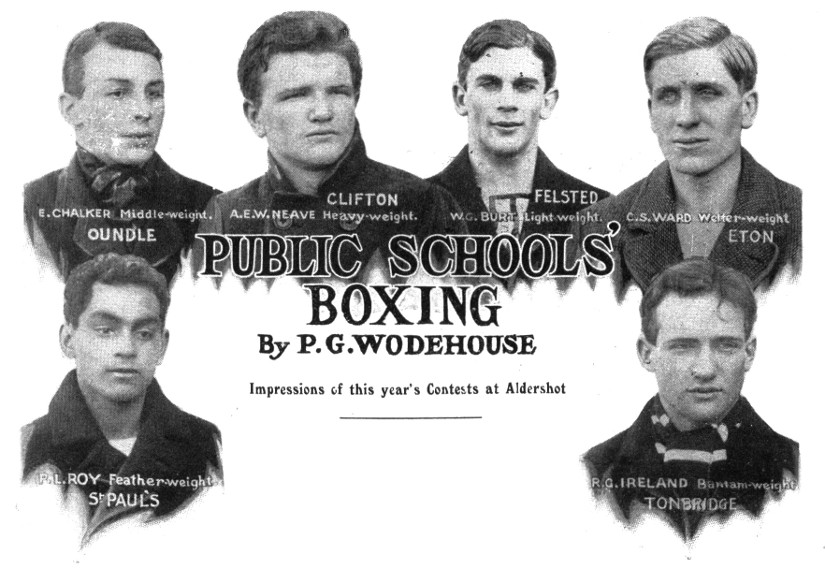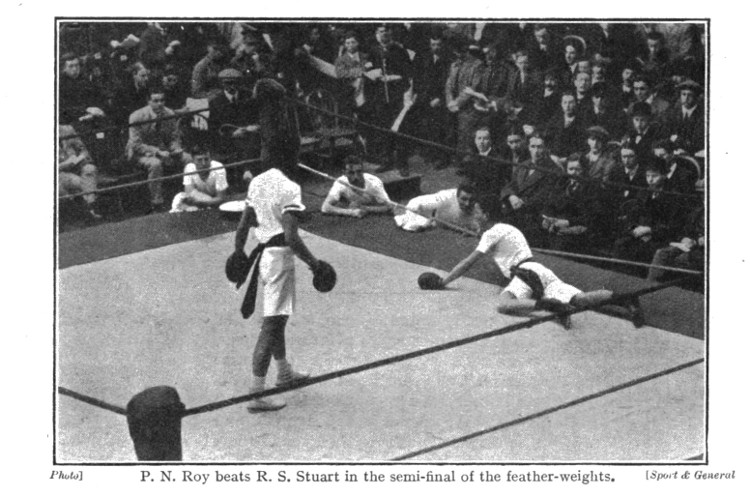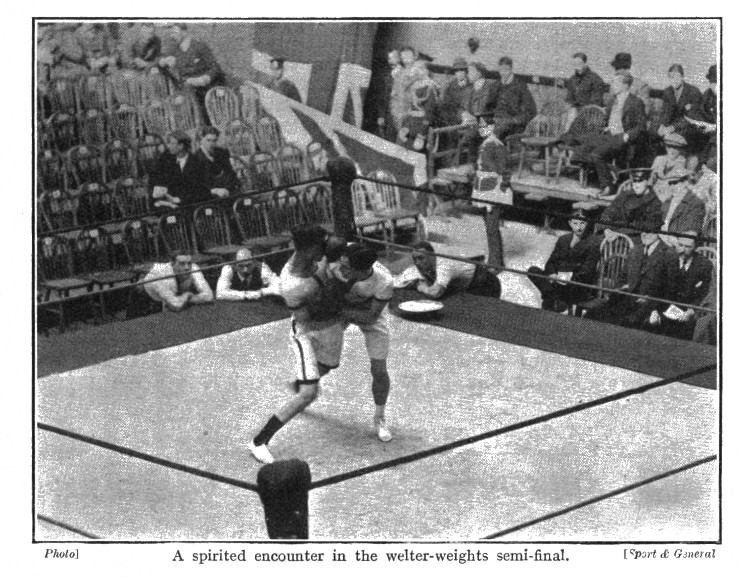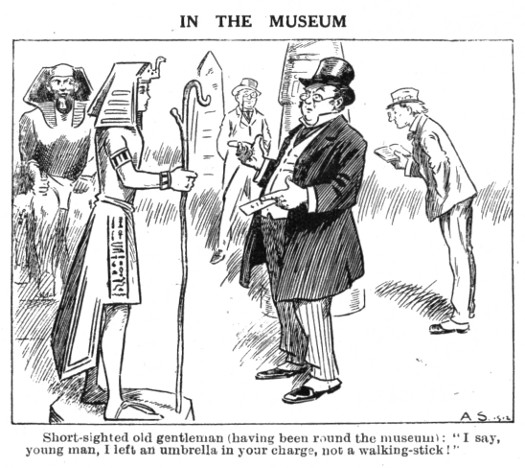The Captain, June 1912

When I entered the Queen’s Avenue Gymnasium this year, and observed two White Hopes in the ring, one with a flowing red scarf about his waist, the other with a flowing green scarf, I thought at first that these ornaments were mere vagaries of individual taste. Æsthetic Smith versus Dressy Robinson, as it were. But each succeeding couple proved to be similarly adorned, and I have been wondering ever since what was supposed to be the point of it.
The fancy-dress effects were not the only novelties of Aldershot, 1912. There were others, as follows (a) For the first time on record, Eton was represented; (b) all last year’s champions were absent; (c) the middle-weights were altered from 11st. 4lbs. to 11st. 6lbs.; the lights from 10st. to 9st. 9lbs.; while a welter-weight championship (10st. 7lbs.) was added; (d) the weighing-in hour on Tuesday was changed from six o’clock to four-thirty, thereby causing the scratching of the Dulwich representatives, who had not kept abreast of the times; (e) a lady spectator fainted during the final of the bantams; and (f) the bouts were decided under Army and Navy Rules instead of those of the Amateur Boxing Association.
(Under Army and Navy Rules the referee shouts “Stop!” at intervals—say, twice or thrice in each round—chats awhile with the fighters, and then sends them on again. It prevents the spectators getting too excited and concentrating on the boxing to the exclusion of the more serious issues of life.)
In a rather indifferent display, taken all round, the bantams stood out by themselves. The semi-finalists were Farrell (Cranbrook), Gow (Malvern), Ireland (Tonbridge), and Davy (Clifton). They had all shown good form in the opening bouts, especially Farrell, who had defeated the Pauline, Rogers, by making a fine recovery in the concluding stages. He had another very rough passage with Gow. In three hurricane rounds there was very little to choose between the two, though Farrell was, perhaps, always a shade ahead. He is a two-handed, aggressive boxer of the Gabain type, with an apparently inexhaustible wind. Gow fought splendidly, and Farrell qualified for the final in a very battered state. Ireland and Davy was a quieter affair, though always spirited. Ireland’s left was always at work, and he won by a fair margin.
It was the final that brought the house down. Farrell, in consideration of his accumulated bruises, might have scratched, without dishonour. He was two closed eyes to the bad before the thing began. But trifles of this kind, one gathered, do not affect Farrell. He went in from the start as if this were the first fight he had had for months. Ireland’s manner conveyed the same impression. He had a little the better of height and reach, and made use of these advantages. There was not a pause during all three rounds. They did not even hesitate. Gradually, Ireland forged ahead. Then he tired, and Farrell, a grisly spectacle, but evidently having the time of his life, pulled up again. In the last round Ireland came back, and won. It was the best final I have ever seen at Aldershot, a classic exhibition of pluck on both sides.

After his showing of the previous year, when he gave even Erskine trouble, it was fairly evident that Roy (St. Paul’s) would win the feathers. This he did, with some ease. Martyn (Bedford), one of his last year’s opponents, harried him considerably, putting up a grand fight, but Roy was always on top. The semi-finalists were Roy, Stuart (Eastbourne), Morgan (Repton), and Morton (Berkhamsted). Roy knocked Stuart out in the third round, when well ahead on points; and Morgan, the hero of a memorable bantam-weight battle in 1911, beat Morton, sustaining a damaged wrist in the process. This handicapped him in the final, and he made no show at all against the Pauline, the referee stopping the fight in the first round. Roy is an excellent boxer of the aggressive type patented by Jerry Driscoll, and should do well in the future.
The light-weights went to W. G. Burt (Felsted), who boxed in last year’s competition. The final, in which Acosta (Tonbridge) was the other principal, was a rather tame affair. Burt, however, knew his business. He was there to win, not to provide sensation for morbid Captain writers, and he kept well away from an opponent whose forte was give-and-take slogging, content to score with light lefts, and avoid returns by means of excellent footwork. His ducking and side-stepping were capital, and he was a winner all the way. A more exciting fight was that between Acosta and Shoobert (St. Paul’s) in the semi-finals. Shoobert tried hard, but Acosta was too strong for him. The other semi-final, between Burt and Davis, of Worksop, was a pretty bit of boxing.
What should have been the most interesting series of the day, the welters, was spoiled to some extent by the scratching of Doherty (Dulwich), who arrived too late to weigh in. Doherty certainly has had the hardest luck, for last year chicken-pox removed him the day before the competition. In 1910 he beat Anderson, the 1909 light-weight champion, and a boxer capable of doing that would have gone far against the opposition provided by the 1912 welters.
Another hard-luck victim was Gavin, of Haileybury, who entered for the light-weights, which he would undoubtedly have won, and found himself on the day of weighing half a pound too heavy. He accordingly moved up into the welters, where he beat Grant (Clifton), and put up a splendid fight against Romilly, of Rugby, the subsequent runner-up. Romilly’s extra weight was too much for him, and, after holding his own for two rounds, he tired and lost. That little more, and how much it is! Half a pound less in weight would have meant a championship medal for Haileybury.

The most interesting figure in the welters was, of course, the Etonian, Ward. The boycotting of the Public Schools’ Championships by Eton during all these years has caused comment, and it is to be hoped that Ward’s entry is to be the beginning of a new era.
Ward is a well-built boxer with a good pair of shoulders and a rather harassed look, as if he had been brooding overmuch on what a correspondent of the Daily Mail calls “that almost national question,” the great Soft Shirts at Eton controversy. Even in the ring he has the detached air of one pondering deep matters. That he is not only a thinker, but a man of action, too, was, however, made manifest in his first encounter, with Macleod (Charterhouse). His eye seemed to lighten as he saw Macleod. “I think I’ll knock this chap out,” he seemed to say. “Anything to distract me for a moment from that frightful soft-shirt business.” And out went Macleod in the first minute.
It was the right medicine. Ward became another man. Up came Mothersill (Bedford). Ward stopped him in the first round, with the jovial energy of one in whose bright lexicon the word shirt is not inscribed.
By this time there was no holding him. A great weight of trouble had been lifted from his mind. Do Etonians wear dickeys? The daily press might have columns on the subject, but he did not care. All he wanted now was to get at Wilkinson (Wellington). Right on the spot where Wilkinson, if an Etonian, would have worn his soft shirt, he smote him, and again on the jaw, and he was in the final, with the remarkable record of having finished three fights without ever going into the second round.
Romilly, meanwhile, had been winning through to the medal class under difficulties. After Gavin, he met Burton (St. Lawrence), and had to take some heavy punishment before he won. He was, therefore, none too fresh for the final. Despite this, however, a great fight ensued. For two rounds and most of the third there was nothing to choose between the two. And in the end it was only after the judges had disagreed that the referee gave the verdict to Ward. A very close thing, but a good decision.
Chalker (Oundle) and Davies (Charterhouse) were one pair of middle-weight semi-finalists; Farr (Bedford) and Rossdale (Clifton) the other. Both semi-finals were full of life, but the final, unfortunately, held no thrills. Davies, except for a moment or two at the beginning of the second round, was no match for Chalker, and the fight did not go the full distance. Farr, with more difficulty, disposed of Rossdale, who was never far behind, though the result was not often in doubt. There seemed every probability of a warm struggle for the championship, but the final provided nearly the tamest fight of the day. Both were over-cautious, and it was only occasionally during the first two rounds that either landed a clean blow. At the start of the last round Farr did what he should have begun by doing, and went in to mix things. He scored several points, then gave up rushing and took matters easily again, with the result that Chalker, using a light, straight left punch, began to go ahead, and eventually won. He deserved his medal, for his work in the early bouts was good; and he was perhaps wise in sticking to long-range work against an opponent who had one knock-out to his credit already.
There was only one real fight in the heavies, for of the three entrants Goldsmith (Denstone), though plucky, was too light to keep out his thirteen-stone opponent Frend, of Tonbridge, and only lasted half a minute. But, to make up for this, the final, between Frend and Neave, of Clifton, was full of vigour and went into an extra round. Frend had the pull in height, reach, and weight, but Neave was tough, and had a good punch in both hands. At the beginning it looked as if Frend, who is light on his feet for his weight, and has a good straight left, would win, but Neave fought back at the body, and in round three did a great deal of work. It was not, however, till after a fourth round that he got the decision.
Take it for all in all, there was a slight flatness about this year’s Aldershot. The shadow of the coal strike seemed to brood upon it. Schools which usually compete, notably Harrow, were unrepresented. The audience, too, was smaller and less enthusiastic than usual. But there were great moments during the day, and nobody who saw the bantam-weight final can have regretted making the journey.
One noteworthy feature of the day was O. E. Mosley’s double victory in the foils and sabres. Mosley, who is at Winchester, is, I believe, still under sixteen, and should reap quite a harvest of medals before he leaves. To win both foils and sabres must be a record. I do not remember it having been done before.
Cheltenham won the gymnastics by one mark from Shrewsbury, Barnard (Cheltenham) and Gibbs (Shrewsbury) being highest individual and runner-up respectively.

 Madame Eulalie’s Rare Plums
Madame Eulalie’s Rare Plums